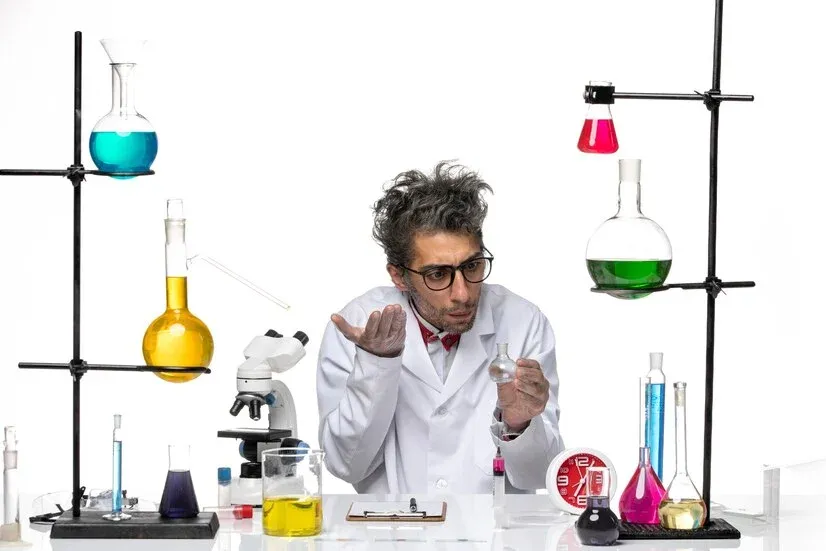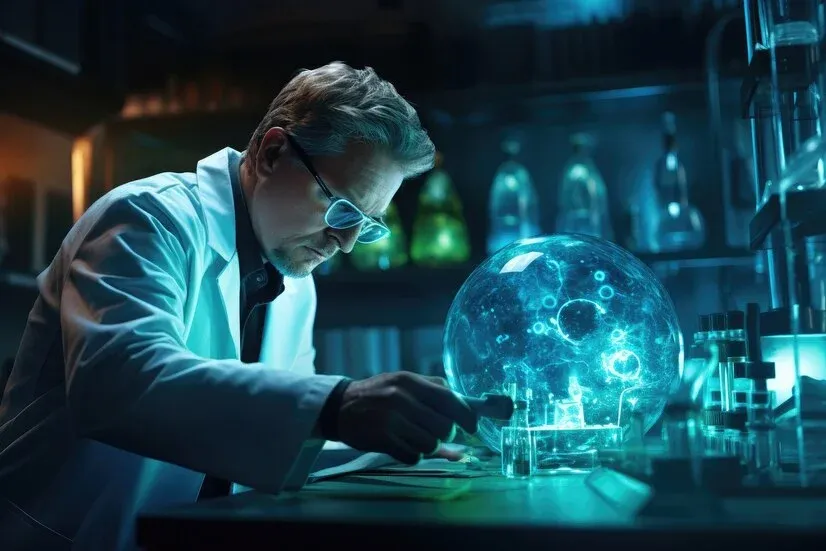How to Become a Scientist after 12th – Top Courses, Scope
Updated: 23 January 2026, 11:24 am IST
Summary
Curious about how to become a scientist after 12th? This blog provides a step-by-step guide on the educational path, courses, entrance exams, and key skills needed to pursue a career as a scientist in India. Discover what to study to become a scientist and how to turn your passion for science into a successful and rewarding profession.
Scientists are behind all the innovations that are driving almost all the sectors, propelling the countries towards economic and social development. If you are a student of science and are curious to know about how to become a scientist after 12th, read on. In this article, we will discuss how an Indian student can embark on the scientist career path after 12th once they have completed their 12th standard.
Get Complete Details From Expert
Basic Eligibility to be a Scientist

1. Educational requirements after 12th for pursuing a career in Science: You must clear your 10+2 exam with the science stream from a recognized board. Your aggregate marks should meet the eligibility score for you to be able to pursue your undergraduate (UG) education in the college or university where you want to.
After this, you must complete your undergraduate (UG) and postgraduate (PG) education in a relevant discipline from a recognized institute. In both these stages of the best courses to become a scientist after 12th, you must score at least 60% marks to be considered eligible for the next stage. The final stage of the process is to get a PhD (Doctor of Philosophy) in the subject of your interest—an essential milestone on the scientist career path after the 12th.
2. Importance of subjects like Physics, Chemistry, Biology, and Mathematics: To begin with, if you want to become a Scientist, you must have studied Physics, Mathematics, and Chemistry in your Class 12. Biology is usually an optional subject in this particular context. These are the fundamental ingredients for what to study to become a scientist after 12th.
3. Additional criteria for specific courses and universities: Apart from these, you also need to clear entrance exams such as the following, as desired by your preferred college or university—an important step in how to become a scientist after 12th and enter a career as a scientist in India:
- NET (National Eligibility Test)
- GATE (Graduate Aptitude Test in Engineering)
- JEE (Joint Entrance Examination) Mains and Advanced
Basic Skills Required to be a Scientist

Essential skills for aspiring scientists: If you want to know the ways how to become a scientist after 12th, you should know the foundational skills you need to shine in the domain. They may be enumerated as below:
- analytical thinking
- self-motivation
- research aptitude
- teamwork
- problem-solving skills
- time management
- creativity
- communication skills
- managerial skills
Teamwork and effective communication are essential skills for scientists these days, especially in the context of research-oriented work. When you can communicate concisely, you can make sure that your colleagues understand you properly—vital for success in a career as a scientist in India.
Steps to Become a Scientist
STEP 1. Complete 12th Grade with Science Stream
STEP 2. Pursue a Bachelor's Degree (B.Sc.)
STEP 3. Clear Entrance Exams – JEE (Joint Entrance Examination) or IISER Aptitude Test.
STEP 4. Pursue a Master’s Degree (M.Sc./M.Tech.)
STEP 5. Qualify National Level Exams - CSIR-NET, GATE, or JRF
STEP 6. Pursuing a Phd.
STEP 7. Gain Postdoctoral Experience
STEP 8. Secure a Research Position - as a research scientist, faculty member, or project leader.
STEP 9. Continuous Learning and Development - attending workshops, conferences, and further training programs.
STEP 10. Contribute to the Scientific Community through innovation, research, and publication.
Entrance Exam for Science Courses
Following are the most popular entrance examinations for courses that can help you make a career after 12th science, and the various details related to the same. Clearing them is essential for crafting your scientific career path after the 12th and deciding what to study to become a scientist:
Name of Exam | Conducting Body | Eligibility Criteria | Exam Pattern | Important Dates* |
NET | National Testing Agency (NTA) | You must not be older than 30 years if you are appearing for the Junior Research Fellowship (JRF). There is no age limit on the exam for the Assistant Professor spot.
You must have scored at least 55% in the Master’s degree exam of the relevant discipline. | There are two papers in the exam – Paper I and Paper II. In Paper I you have 50 questions and in Paper II you have 100 questions. | The exam is conducted twice a year – December and June. |
GATE | GATE Committee | You must be at least in the final year of your UG program to take the test.
You must have completed or are in the final year of a program in any of the following streams and disciplines which must be approved by the Indian government:
Engineering Technology Architecture Science Commerce Arts | The question papers in the test are in any one of three modes – MSQ (multiple select questions), MCQ (multiple-choice question), and NAT (numerical answer type) | The exam is conducted only once a year – during February. |
JEE Mains | NTA | You must have passed your 10+2 at least two years before the year you take the exam. Students who are appearing in the Class 12 exam can also take part in JEE Mains in the same year. | This is a three-hour online exam with three sections – Mathematics, Chemistry, and Physics. It has 90 questions and 75 are compulsory. Section A has 20 MCQs and Section B has 10 numerical questions. The exam carries a full mark of 300. | JEE Mains is usually held in the first week of April. |
JEE Advanced | The seven zonal coordinating IITs IIT (Indian Institutes of Technology) conduct the test. They may be enumerated as below:
IIT Kharagpur IIT Kanpur IIT Madras IIT Delhi IIT Bombay IIT Guwahati IIT Roorkee | You must be in the top 2.5 lakh successful candidates in the B.E. (Bachelor of Engineering) or B.Tech (Bachelor of Technology) paper that you attempted in the JEE Mains.
If you are a general candidate you should not be older than 25 years.
You cannot attempt the exam more than twice in two consecutive years.
You must have appeared in your Class 12 exam not later than the previous year.
You must not have been admitted to an IIT. | This is an online examination conducted in Hindi and English. It has two papers – Paper 1 and Paper 2 – and both are mandatory. You get three hours for each exam and both these papers have three subjects – Physics, Mathematics, and Chemistry. | JEE Advanced is normally conducted in the third week of April. |
*Please note that the dates of these exams keep changing. So, you should check with the official website of the examination and/or the conducting authority to find out the exact dates for the year when you will take the exam.
Top Courses in Science (Degree Level)

The following table provides comprehensive information on the best courses to become a scientist and supports what to study to become a scientist:
Course name | Duration | Specializations available | Eligibility criteria | Key features |
Bachelor of Science (BSc) | 3 years | Agriculture Biochemistry Computer Science Dietetics Electronics
| At the very least you must have completed your 10+2 and procured a diploma or an equivalent of the same. Depending on the college or university where you wish to get admitted you may also need to score a certain number of marks in the 12th-standard exam to be considered eligible for the course. | BSc courses usually focus on Natural Sciences, Mathematics, and Technical Subjects (STEM). They include core science courses along with specialization subjects and labs. They help you develop analytical, quantitative reasoning, problem-solving, and technical skills. |
Integrated MSc (Master of Science) programs | 5 years | Biology Chemistry Environmental Science Material Sciences Mathematics Physics | Candidates must have completed their Class XII from a recognized board. They should have scored a minimum average of 60% marks in Physics, Mathematics, Chemistry, and English in Classes 11 and 12. | These courses offer you a solid grounding in all the aspects of the subject that you are specializing in. They also provide you with access to the latest and best research and opportunities to work in the industry. |
B.Tech in Biotechnology | 4 years | Medical Biotechnology Industrial Biotechnology Environmental Biotechnology Marine Biotechnology | You must have completed your 10+2 from a recognized board with Physics, Chemistry, Mathematics, and Biology along with English as a compulsory subject. You must be at least 17 years old at the time of enrolment and should have scored at least 75% in your Class 12 exam. If you have taken any entrance test such as JEE Mains you must submit its details. | These courses focus on the basic concepts of engineering that are used in Applied Biology and Chemical Engineering. It also focuses on areas such as environmental conservation, health, medicines, and technology. |
Bachelor of Pharmacy (B.Pharm) | 4 years | Pharmaceutical Analysis Pharmaceutics Pharmacology Pharmacognosy Hospital Pharmacy | You must have scored at least 45% in Physics, Chemistry, Mathematics, and Biology if you are a general student. If you are an SC (Scheduled Caste), ST (Scheduled Tribe), PWD (Person with Disability), or OBC (Other Backward Caste) student this will come down to 40%. You must also have scored at least 30% in English no matter what category of student you are. Both these mark requirements are in the context of your Higher Secondary exam. You must be physically and mentally healthy too. | These courses offer you practical training that improves your employability and helps you develop a certain level of practical expertise. They also provide you with all-round education in the discipline. |
MSc | 2 years | Mathematical Methods (Physics) Introduction to Programming Language through C (IT or Information Technology) Structured and Object-Oriented Programming (Computer Science) Game Theory (Economics) Virology (Microbiology) | You must have a Bachelor’s Degree in the relevant discipline from a recognized university or college. You also need to get at least between 50 and 60% to be considered eligible for the program. | MSc courses offer you a minimum of 50 specializations. They are also classed into three groups – MSc courses, MSc Tech courses, and Integrated MSc courses. |
Master of Technology (M.Tech) in Engineering | 3 years | Artificial Intelligence (AI) VLSI (Very Large Scale Integration) Design and Embedded System IT CAD (Computer-Aided Design)/CAM (Computer-Aided Manufacturing) Computer Science Engineering | You must have completed your Bachelor’s from a recognized university or college. | These courses allow you to work in Research and Development (R&D). They also offer you a wide range of specializations which open up so many possibilities. |
Importance of specialization and research focus in postgraduate studies: When you select the right specialization during your Master’s, it provides you with a valuable and unique set of knowledge and skills that advance not only your academics but also help you grow your career to a desired level.
Research work done at this stage propels your passion for inquiry, enhancing your career as a scientist in India and reinforcing your scientist career path after 12th.
Also read:- Amity’s Placement Success Stories
Top Colleges Offering Science Courses

College name | Location | Courses offered | Admission criteria | Rankings (NIRF or National Institutional Ranking Framework) |
Miranda House, University of Delhi | Delhi | BSc (Hons.) in Mathematics BSc (Hons.) in Zoology BSc in Physical Science (Computer Science) MSc in Zoology MSc in Mathematics | CUET and CBSE (Central Board of Secondary Education) Class 12 results for UG courses and CUET-PG for PG courses. | 1 |
Hindu College, University of Delhi | Delhi | BSc (Hons.) in Statistics BSc (Hons.) in Mathematics BSc (Hons.) in Zoology MSc in Zoology MSc in Statistics | CUET (Central Universities Entrance Test) for UG courses and CUET-PG for PG courses. | 2 |
Kirori Mal College, University of Delhi | Delhi | BSc in Analytical Chemistry BSc (Hons.) in Statistics BSc (Hons.) in Mathematics Master of Operational Research MSc in Chemistry | CUET for UG courses and CUET-PG for PG courses | 9 |
Hansraj College, University of Delhi | Delhi | BSc (Hons.) in Computer Science BSc (Hons.) in Zoology BSc (Hons.) in Geology MSc in Geology MSc in Mathematics | CUET for UG courses and CUET-PG for PG courses | 3 for BSc courses and 12 overall |
MCC (Madras Christian College) | Chennai | BSc in Microbiology BSc in Visual Communication BSc in Plant Biology and Plant Biotechnology MSc in Applied Microbiology MSc in Statistics | CBSE and Tamil Nadu state Class 12 exams results for UG courses. | 16 |
Top Government and Non-Government Bodies that Hire Scientists

The following table represents the top recruiters (government and private organizations) of Scientists and the salaries that they offer to such professionals:
Name of Organization | Average annual salary range in Rs |
Indian Space Research Organization (ISRO) | 900,000 to 20,00,000 |
Bharat Biotech | 800,000 to 18,00,000 |
Reliance Industries | 800,000 to 16,00,000 |
Tata Consultancy Services (TCS) | 600,000 to 15,00,000 |
Infosys | 600,000 to 12,00,000 |
Wipro | 500,000 to 12,00,000 |
These are the roles central to any scientist career path after 12th in India, aligning with best courses to become a scientist and career as a scientist in India:
The following table shows the top job profiles available to Scientists in India and the salaries they can expect in those professions:
Profession | Average annual salary range in Rs |
Pharmaceutical Scientist | 10 lakhs |
Research Scientist | 9.2 lakhs |
Astrophysicist | 6.9 lakhs |
Chemical Engineer | 6.8 lakhs |
Biomedical Scientist | 5.1 lakhs |
Material Scientist | 4.2 lakhs |
Data Scientist | 3.8 lakhs to 15.9 lakhs |
Environmental Scientist | 3.3 lakhs |
Several factors affect the salary of a Scientist in India. This includes role, experience level, organization, and specific skills—all shaped by the scientist career path after 12th and what to study to become a scientist on your educational journey.
Take the next step in your career ?
Take the next step in your career ?
Wrapping Up
You must pursue a branch of science that you are passionate about—critical for how to become a scientist after 12th. This field must be one for which you are willing to invest effort and strategy. For a sustainable career as a scientist in India, select the best courses to become a scientist and follow the scientist career path after 12th with diligence. Explore Amity Online and other accredited platforms to access these pathways.
Your roadmap from what to study to become a scientist at Class 12 to advanced qualifications, is your blueprint for becoming a scientist. I'm ready to help refine your metadata or editorial guidelines if needed!
Check Out Our Top Online Degree Programs
Explore similar programmes
frequently asked questions
What are the top courses to pursue after 12th to become a Scientist?
+The best courses to take up immediately after Class 12 to become a Scientist are a BSc course, integrated MSc programs, B.Tech in Biotechnology, and B.Pharm.
What subjects should I focus on in 12th grade to pursue a career in Science?
+If you want to become a Scientist in Class 12 you should focus on the following subjects in your 10+2 level: Physics Chemistry Mathematics/Biology English
What is the scope of a career as a Scientist?
+There are plenty of opportunities that you can work in when you become a Scientist, namely industry innovation, government agencies, academic research etc. As a Scientist the career path can lead to roles in research and development, teaching, consultancy and many more.
What are the necessary skills to become a successful Scientist?
+If you want to become a Scientist after Class 12 you must possess the following skills: analytical thinking self-motivation research aptitude teamwork problem-solving skills time management creativity communication skills
What are some prestigious institutions in India for pursuing a career in Science?
+The best institutions where you can study Science after Class 12 may be enumerated as below: Miranda House, University of Delhi Hindu College, University of Delhi Kirori Mal College, University of Delhi Hansraj C
Can I pursue a career as a scientist without a Ph.D.?
+Yes, you can find work as a Scientist in applied research even if you do not have a PhD. However with a PhD your scope becomes very broad.
Are there any scholarships available for students pursuing science courses?
+The government of India along with various other colleges, universities, and organizations offer generous scholarships so that students can be encouraged to study and research in Science after Class 12.

